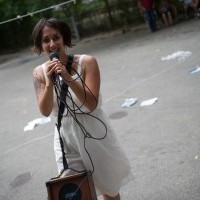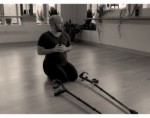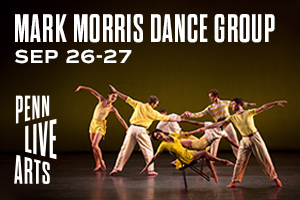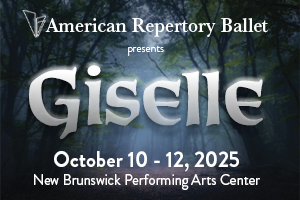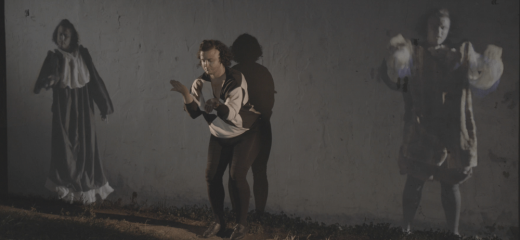
Conversations with queer ancestors
by Kristen Shahverdian
*Eppchez uses Elverson pronouns: They-Ey, Them-Em, Their-Eir, Themselves-Emself
“How are you supposed to greet your ancestors?” This provocative line opens Publik Private, a play streamed on YouTube, written and performed by Eppchez!
The scene opens on a small empty lot alongside a building. There are two piles of clothes on the ground and a screen displays a date and location: Sept. 5, 2020, Philadelphia, PA. Eppchez tiptoes into view, leans into the clothes then turns to the camera and projects a large, delighted smile. I am instantly captivated by Eppchez’s excitement and curiosity. The gently pulsing musical score builds as Eppchez’s arms beckon to each clothing pile. Eir* hands stir and rotate around each other, moving upward as if conjuring spirits or performing a spell. This propulsion of energy bursts out of eir hands as eir arms spike overhead, and I know the spell is successful when ghostly figures of Eppchez emerge, projected into the space. Eppchez remains in the middle, while the projections on either side show em wearing the clothes, which I now realize are costumes, before removing and hanging them on the wall. Eppchez in the flesh invites us in with a literal beckoning of eir fingers to come closer, join in, and meet these characters.
Eppchez is The Darb, a self-described “21st Century very earnest clown,” and ey state that the goal of the play “is [to] contextualize my charge by connecting to ancestors. Ancestors in a cosmic queer sense, like chosen family. Historical trans people I can see myself in.”
After this dynamic build-up, I am momentarily lost when Eppchez introduces the two historical figures, The Publik Universal Friend and La Monja Alferéz. I have no more clarity than when these figures were just clothes on the ground. Although confused, I remain cognizant that neither historical figure is in my knowledge base, which reflects the histories I have learned and, as Eppchez says, is a result of “queer erasure.” After sitting in confusion for several minutes, I solve this problem by pausing the piece and digging online.
The Publik Universal Friend and La Monja Alferéz had very different life experiences, but both denounced the gender told to them at birth. When Eppchez, as The Darb, acts out each character, ey tell their stories: La Monja Alferéz escaped from a life in a Spanish convent and lived as a man; The Publik Universal Friend was an evangelist from Rhode Island who proclaimed no gender. In one scene, Eppchez, as La Monja Alferéz, wraps a poultice around his breasts to reduce them and sews his skirt into pants. All of these actions represent freedom, and as Alferéz’s says, “this will save my life.” La Monja Alferéz had a life of action inclusive of travel from Spain to America, sword fights and wars, and lovers. This dynamic life portrayed through concrete action is easier for me to imagine than The Publik Universal Friend’s, whose speeches sound like direct replicas of 18th Century religious lectures. As excited as The Darb is at the beginning of the play, the joyful curiosity that propels em to conjure these figures falls into a pattern of interrogation rather than conversation. There is great reason for disappointment; The Darb described ways that each participated in colonialism, judgement, violence, and shaming of others. However, going so quickly into the faults of these characters stops me from connecting to them. Without that connection, The Darb’s judgement holds less weight.
I find myself wondering who The Darb is. Are ey a stand-in for the audiences’ present day perspectives on the past? Is eir judgment our collective judgement? I want to empathize with The Darb, but I never really know who ey are. The Darb at one point proclaims wanting to know the historical figures' internal life as opposed to what historians have written about them. I feel that same hunger for all three characters. I would love to see em deviate from the speeches and big concepts around colonialism, race, and gender and re-imagine the daily lives and internal thoughts and feelings of all three characters.
“What do I do with you?” The Darb asks the conquerer, La Monja Alferéz. This conflict and the sorrow that is held within that comment is one of the gems of the play, and it reverberates after the play’s end. There is a resonance with how we reconcile the deeds of our ancestors (in the non-familial sense), and how that reflects our present. As our narrator looks to the past with judgement and some compassion, I see a desire for a different history, along with an unflinching acknowledgement of eir ancestors’ truths.
Eppchez!, Publik Private, available online through June 15th and during the upcoming Philadelphia Fringe Festival, Sept. 9-Oct. 2.
By Kristen Shahverdian
June 30, 2021

